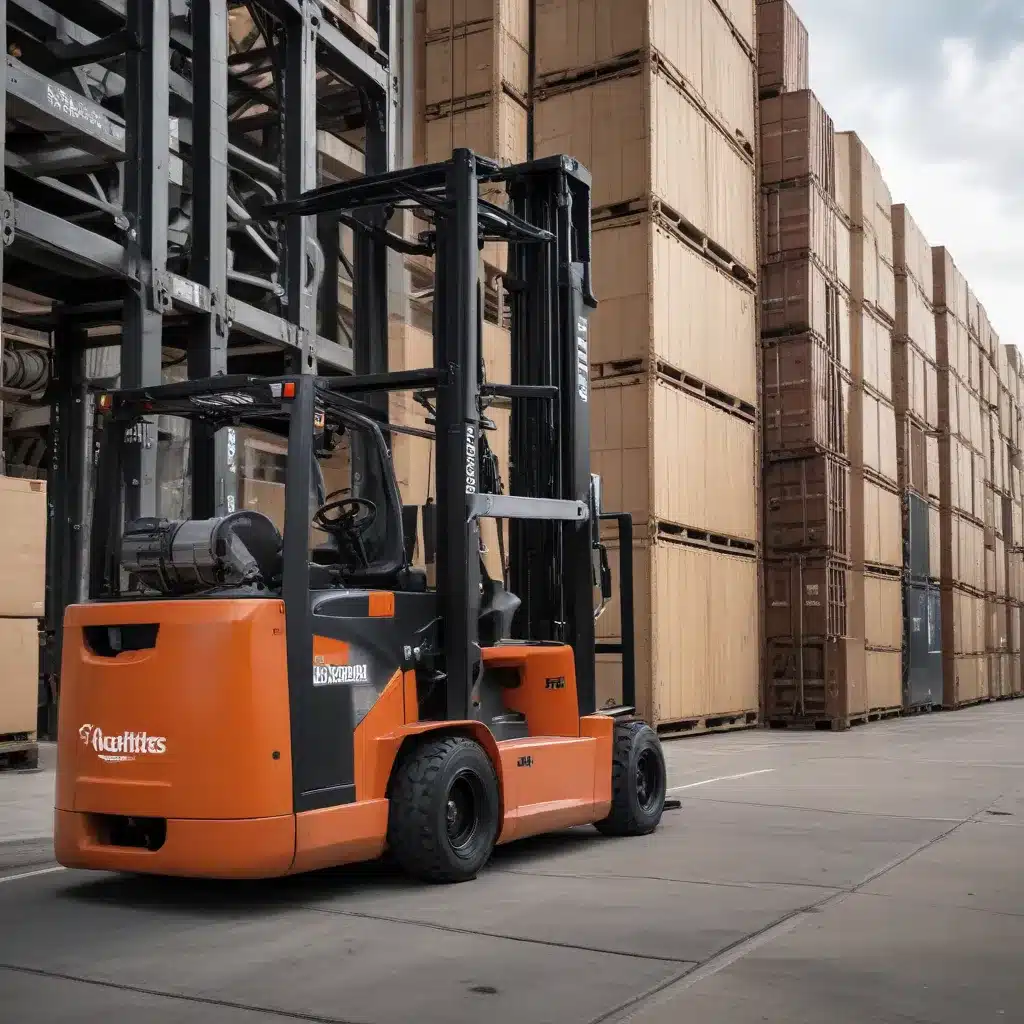
Embracing the Electric Revolution in Warehousing and Logistics
The world of warehousing and logistics is undergoing a profound transformation, driven by the increasing adoption of electric forklifts. As sustainability becomes a paramount concern across industries, these innovative machines are emerging as the solution to powering a greener, more efficient future.
The Advantages of Electric Forklifts
Reduced Emissions and Environmental Impact
Electric forklifts are the embodiment of sustainable innovation, offering a clean and emission-free alternative to their traditional diesel and propane-powered counterparts. By eliminating harmful exhaust gases, these machines significantly reduce the carbon footprint of warehousing and logistics operations. According to EnerSys, the avoided emissions associated with the use of their batteries in electric forklifts can range from 5 to 10 times the emissions from mining, manufacturing, and shipping the batteries, with the potential to reach a 20x net benefit in some locations.
Improved Energy Efficiency and Cost Savings
Beyond the environmental benefits, electric forklifts also deliver tangible economic advantages. Their superior energy efficiency translates to lower operational costs, as they require less energy to perform the same tasks as their combustion-engine predecessors. This reduction in energy consumption not only lowers electricity bills but also minimizes the ongoing maintenance expenses associated with traditional forklifts.
Quieter and More Comfortable Workspaces
The silent operation of electric forklifts creates a more pleasant and productive work environment for employees. Without the constant rumble and vibration of internal combustion engines, warehouses and distribution centers become quieter, more comfortable spaces that enhance worker well-being and job satisfaction.
The Rise of Renewable Hydrogen Forklifts
While battery-electric forklifts have emerged as the leading sustainable alternative, another innovative solution is gaining traction: hydrogen-powered forklifts. These machines harness the power of renewable hydrogen, a clean energy source that produces only water vapor as a byproduct, making them an even more environmentally friendly option.
Lhyfe highlights the game-changing potential of hydrogen forklifts, which combine impressive performance with unparalleled environmental responsibility. The integration of renewable hydrogen into these vehicles showcases the industry’s commitment to sustainable development and the preservation of our planet.
Overcoming the Challenges
As with any transformative technology, the widespread adoption of electric and hydrogen forklifts faces some challenges. Infrastructure needs, such as the availability of charging stations and hydrogen refueling facilities, can present obstacles in certain regions. Additionally, the initial cost of these advanced machines may be higher than their conventional counterparts, requiring financial incentives and supportive policies to drive widespread adoption.
However, the industry is rising to meet these challenges head-on. EnerSys is leading the way, demonstrating a steadfast commitment to sustainability and empowering its customers to achieve their own environmental goals. As technological advancements continue and infrastructure matures, the barriers to electric and hydrogen forklift adoption are steadily being overcome.
The Transformative Impact on Warehousing and Logistics
The rise of electric and hydrogen forklifts is poised to reshape the warehousing and logistics sectors, driving a wave of sustainable innovation that will reverberate throughout the industry.
Greener Operations and Reduced Emissions
By transitioning to electric and hydrogen-powered forklifts, warehouses and distribution centers can significantly reduce their carbon footprint. These advanced machines, combined with renewable energy sources, enable logistics operations to minimize their environmental impact, aligning with the global push towards Net Zero emissions by 2050.
Increased Efficiency and Operational Savings
The enhanced energy efficiency of electric and hydrogen forklifts translates to tangible cost savings for businesses. With lower fuel and maintenance expenses, as well as the potential for increased productivity, companies can streamline their operations, improve their bottom line, and reinvest in further sustainability initiatives.
Attracting Eco-Conscious Consumers and Clients
As sustainability becomes a key driver for consumer and client decision-making, the adoption of electric and hydrogen forklifts can serve as a powerful differentiator. Businesses that embrace these sustainable solutions can position themselves as industry leaders, appealing to eco-conscious customers and partners who seek to align with environmentally responsible organizations.
Fostering Innovation and Job Creation
The transition to electric and hydrogen forklifts is not just about environmental benefits; it also stimulates economic growth and job creation. The development and manufacturing of these advanced machines, as well as the supporting infrastructure, open up new opportunities for innovation and employment across the logistics and transportation sectors.
Enhancing Worker Safety and Comfort
The quieter operation and zero-emission profiles of electric and hydrogen forklifts create a more pleasant and safer work environment for employees. Reduced noise levels, improved air quality, and the elimination of exhaust fumes contribute to a healthier and more comfortable workplace, ultimately enhancing worker well-being and productivity.
Embracing the Future of Sustainable Logistics
As the world increasingly embraces sustainability, the warehousing and logistics industries are at the forefront of this transformative shift. The adoption of electric and hydrogen forklifts is a pivotal step in powering a more environmentally responsible future, one that aligns with global initiatives and the evolving demands of consumers and businesses alike.
By leveraging the advantages of these advanced machines, logistics operations can not only reduce their carbon footprint but also unlock new avenues for cost savings, operational efficiency, and enhanced employee satisfaction. As the industry continues to innovate and overcome the remaining challenges, the future of sustainable logistics looks increasingly bright.
At Forklift Reviews, we are dedicated to providing you with the latest insights, practical tips, and in-depth reviews to help you navigate the ever-evolving world of forklifts. Whether you’re exploring electric, hydrogen, or other sustainable forklift solutions, our team of industry experts is here to empower your journey towards a greener, more efficient logistics landscape.

